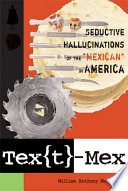Product desciption
Textmex Seductive Hallucinations Of The Mexican In America William Anthony Nericcio by William Anthony Nericcio 9780292714571, 9780292714564, 0292714572, 0292714564 instant download after payment.
“Marvels! Rompecabezas! And cartoons that bite into the mind appear throughout this long-awaited book that promises to reshape and refocus how we see Mexicans in the Americas and how we are taught and seduced to mis/understand our human potentials for solidarity. This is the closest Latin@ studies has come to a revolutionary vision of how American culture works through its image machines, a vision that cuts through to the roots of the U.S. propaganda archive on Mexican, Tex-Mex, Latino, Chicano/a humanity. Nericcio exposes, deciphers, historicizes, and 'cuts-up' the postcards, movies, captions, poems, and adverts that plaster dehumanization (he calls them 'miscegenated semantic oddities') through our brains. For him, understanding the sweet and sour hallucinations is not enough. He wants the flashing waters of our critical education to become instruments of restoration. In this book, Walter Benjamin meets Italo Calvino and they morph into Nericcio. Orale! -Davíd Carrasco, Harvard University A rogues' gallery of Mexican bandits, bombshells, lotharios, and thieves saturates American popular culture. Remember Speedy Gonzalez? “Mexican Spitfire” Lupe Vélez? The Frito Bandito? Familiar and reassuring-at least to Anglos-these Mexican stereotypes are not a people but a text, a carefully woven, articulated, and consumer-ready commodity. In this original, provocative, and highly entertaining book, William Anthony Nericcio deconstructs Tex[t]-Mexicans in films, television, advertising, comic books, toys, literature, and even critical theory, revealing them to be less flesh-and-blood than “seductive hallucinations,” less reality than consumer products, a kind of “digital crack.” Nericcio engages in close readings of rogue/icons Rita Hayworth, Speedy Gonzalez, Lupe Vélez, and Frida Kahlo, as well as Orson Welles' film Touch of Evil and the comic artistry of Gilbert Hernandez. He playfully yet devastatingly discloses how American cultural creators have invented and used these an


